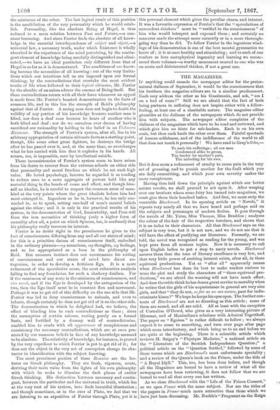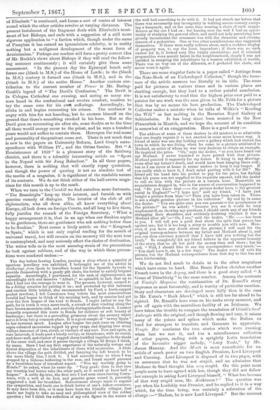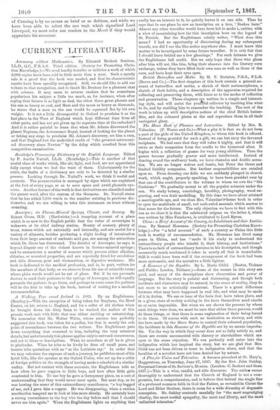THE MAGAZINES.
IF anything could console the newspaper editor for the preter-
natural dullness of September, it would be the consciousness that his brothers the magazine editors are in a similiar predicament.
Each may address the other as his Guatimozin, and ask, "am I on a bed of roses ?" Still we are afraid that the fact of both being partners in suffering does not inspire either with a fellow- feeling, at least one of a charitable nature. The magazine editor grumbles at the dullness of the newspapers which do not provide- him with subjects. The newspaper editor complains of the dullness of the magazines which have to be read and reviewed, and which give him no hints for sub-leaders. Each is on his own coals, but then each hauls the other over them. Painful spectacle
of human selfishness, and of the indifference of the world to all that does not touch it personally ! We have read in Gray's Odes,—
To each his sufferings ; all are men Condemned alike to groan, The tender for another's pain, The unfeeling for his own.
But it does seem a refinement of cruelty to cause pain in the very act of groaning, and to punish another for the fault which you
are daily committing, and which your own severity makes the more conspicuous.
Having thus laid down the principle against which our better- nature revolts, we shall proceed to act upon it. After weeping over our brothers whom some fairy has turned into magazines, we must give them their hundred lashes. And first, we must strip the venerable Blackwood. In its opening article on " Novels," it repeats very nearly all that we have heard and perhaps said on the subjects and personages of modern fiction. It goes through the novels of Mr. Yates, Miss Thomas, Miss Braddon ; analyzes.
the colour of the hair of the respective heroines, and shows that it is an index to their characters. All that Blackwood says on the subject is very true, but it is not new, and we do not see that it will have the effect of purifying our literature. Formerly, we are told, the novel was recognized as reading for the young, and was kept pure from all noxious topics. Now it is necessary to call upon English ladies to put a stop to nasty novels. Blackwood assures them that the tone of literary excellence is very low, and that very little power of exciting interest exists, after all, in these equivocal productions. Yet as " after all " apparently means when Blackwood has done its best to make readers curious to trace the plot and study the characters of " these equivocal pro- ductions," we are afraid the warning will not have much effect. And does the critic think he has done a great service to moralitywhen he writes that the girls of his acquaintance in general are very nice girls, and that" they do not, so far as we are aware, pant for indis- criminate kisses ?" We hope he keeps his eyes open. The further con- tents of Blackwood are not so diverting as this article ; some of them are sound, and all are solid. All at least with the exception of Cornelius O'Dowd, who gives us a very interesting picture of Miramar, and of Maximilian's relations with Admiral Tegetthoff. The paper on " Egoism " is rather difficult to follow ; we always expect it to come to something, and turn over page after page which seem introductory, and which bring us to an end before we are quite at the beginning. There is a scientific article which reviews M. Saigey's " Physique Moderne," a national article on the " Literature of the Scottish Independence Question ;" a. political article on the " Question Settled," followed by some of those verses which are Blackwood's most unfortunate speciality ; and a review of the Queen's book on the Prince, under the title of " A Royal Idyll." This, too, has been done before, and though all the Magazines are bound to have a review of what all the newspapers have been reviewing, it does not follow that we are bound to read all that every one has written.
As we close Blackwood with the " Life of the Prince Consort," so we open Fraser with the same subject. Nor are the titles of the papers in Fraser much more attractive than those which we have just been discussing. Mr. Buckle's " Fragment on the Reign of Elizabeth" is continued, and forms a sort of centre of interest round which the other articles revolve at varying distances. The present instalment of the fragment deals with Elizabeth's treat- ment of her Bishops, and ends-with a suggestion of a still more rigorous application to " a faction which, though under the name of Puseyism it has earned an ignominious celebrity, is in reality
nothing but a malignant development of the worst form of Arminianism." Perhaps our readers will form a pretty correct idea of Mr. Buckle's views about Bishops if they will read the follow- ing sentence continuously ; it will certainly give them some amusement. "In the present day the Episcopal bench only forms one (blank in M.S.) of the House of Lords ; in the (blank in M.S.) century it formed one (blank in M.S.), and in the (blank in M.S.) of the entire House." Another curious con- tribution to the current number of Fraser is Mr. Baring-
Gould's legend of " The Devil's Confession." The Devil is in Cologne Cathedral one evening, and seeing so many sin- ners kneel in the confessional and receive comfort, resolves to try the same cure for his wive sufferings. Accordingly, he slinks in and begins recounting his crimes. The confessor is angry with him for not kneeling, but he excuses himself on the ground that there's something crooked in his knee. But as the Devil goes on recounting sin after sin, some doubts as to the time all these would occupy occur to the priest, and he says a hundred years would not suffice to contain them. Hereupon the real name and personality of the penitent come out. There is not much that is new in the papers on University Reform, Lord Grey's corre- spondence with William IV., and the Orissa famine. But "A Reminiscence of 1859 " is a pleasant story of the Salzburg district, and there is a tolerably interesting article on "Sport in the Nepaul with Sir Jung Bahadoor." In all these papers, however, there is nothing that will exactly repay quotation, and though the power of quoting is not an absolute test of the merits of a magazine, it is significant of the readable nature of its contents. We do not think either of the half-crown maga- zines for this month is up to the mark.
When we turn to the Cornhill we find ourselves more fortunate.
"The Bramleighs " keep up their interest, and furnish us with genuine comedy of dialogue. The interior of the club of old diplomatists, who all dress alike, all know everything about Europe, all look down on foreign Courts, and all long to live there, fully justifies the remark of the Foreign Secretary, " What a happy arrangement it is, that in an age when our flunkies aspire to be gentlemen, there are gentlemen who ask nothing better than to be flunkies." Next comes a lively article on the " Knapsack in Spain," which is not only capital reading for the month of
universal travel, but will remain on the memory till the next tour is contemplated, and may seriously affect the choice of destination. The writer tells us in the most amusing strain of the precautions he took against robbers, and of the way in which those precau- tions were rendered useless:— The day before leaving London, passing a shop where a quantity of spurious jewellery was exhibited, I bethought me of the advice in Gatherings from Spain to travellers bound for the Spanish byroads to provide themselves with a gaudy gilt chain, the better to satisfy brigand rapacity. Accordingly, I purchased, for the sum of eighteenpence, an exceedingly rich and massive "Albert ;" so splendid, in fact, that up to this I had not the courage to wear it. The present, however, seemed to be a fitting occasion for putting it on ; and protected by this talisman and another little trinket, also recommended by Ford, a fresh-capped pocket revolver, I left Carratraca long before the most conscientious invalid had begun to think of his morning bath, and by sunrise had got over the first league of the road to Ronda. I ought rather to say the path, for in truth it was a mere track, a streak of dust winding along the bare brown mountain-aide, and scarcely distinguishable from it. I cannot honestly commend this route to Ronda for richness or soft beauty of landscape ; but there is a pervading grimness about the scenery which saves it from being common-place. It is a good sample of "tawny Spain" in her tawniest mood. League after league the path runs on climbing sepia-coloured mountains topped by grey crags, and dipping into stony valleys innocent of tree, shrub, or verdure of any sort. Now and again, at rare intervals, it leads past a lonely cortijo, or farmhouse, with its corral, and draw-well, and cluster of ragged sheep huddled together in the shade of the outer wall, and once it passes through a village, El Borgo, I think, by name. Here I had my first experience of the naturally savage and brutal disposition of the inhabitants of these wild mountains. A little above the village the path divided, and fancying the left branch to be the more likely line, I took it. I had scarcely done so when I was stopped by a hideous bellowing in the rear, and found myself pursued by a breathless boor of truculent aspect. "Was my worship going to Ronda?" he asked, when he came up. " Very good ; then in that case my worship had better take the other path, as it saved at least half a league." A noble fig-tree, the first tree I had seen since leaving Carra- trace, with a well at its foot, and genuine grass round it, presently suggested a halt for breakfast. Refreshment always tends to expand the sympathies, and leads one to think better of one's fellow-creatures. It may have been this, or it may have been the friendly villager, that made me begin to take an easy and philosophical view of the robber question ; but I think the reflection of my own figure in the waters of
the well had something to do with it It had not struck me before that there was necessarily any incongruity in walking across country carry- ing a knapsack, and at the same time wearing a chain of such magni- ficence as the one I had on ; but leaning over the well I had an oppor- tunity of studying the general effect, and could not help perceiving how grossly inconsistent the ornament was with the character and circum- stances of a pedestrian. One or two other considerations also suggested themselves. If there were really robbers about, such a reckless display of property was, to say the least, imprudent ; if there was no such excuse for it, it looked very like vulgar ostentation ; and if criminal propensities were merely latent in the neighbourhood, clearly I was not justified in tempting the inhabitants by a wanton exhibition of wealth. There was no way out of the dilemma, so I pocketed the chain, and never wore it again.
There are some singular facts in a paper called " Jottings from the Note-Book of an Undeveloped Collector," though the loose- ness of the article answers too literally to its title. The sums paid for pictures at various times and in various places are startling enough, but they lead to a rather painful conclusion. It is not satisfactory to read that the highest price ever paid to a painter for one work was the sum given to Mr. Frith for a picture that was by no means his best production. The Undeveloped Collector makes a mistake when he talks of Wilkie's "Reading the Will" as fast melting in the Bavarian Royal Gallery at Schleissheim. It has long since been removed to the New Pinacothek in Munich, and we hope the account of its condition is somewhat of an exaggeration. Here is a good story :—
The address of some of these dealers in old masters is so admirable that one deeply regrets it is not exerted in some more honest way. A
friend of mine was one day looking over a gallery which had visited the town in which he was living, when he came to a picture attributed to Morland, an artist of whom ho was very desirous to obtain an example.
He inquired the price. "Oh," says the dealer, "so you have found out my Morland. I never intended to have parted with that picture. Morland painted it expressly for my father. It hung in my drawing- room after my father's death, and would have been hanging there still ; but as I am never at home it seems useless to keep it any longer. If you really wish to have it, I don't mind parting with it for 301." My friend put his hand into his pocket to pay for the prize, but finding that his purse was not supplied to the requisite amount, told the dealer to call on him with the picture at a certain hour. Meanwhile an acquaintance dropped in, who in the course of conversation happened to say, " Do you know that — the picture dealer here, is the greatest rascal in England?"—"I hope not," said my friend. " I have just bought a picture from him."—" Then you have been taken in. There is not a single genuine picture in his collection." By and by in came the dealer. "You are quite sure you can guarantee the genuineness of the picture ?" he was asked ; "because you see it would be very
unpleasant if, on showing my purchase, I should catch any of my friends shrugging their shoulders, and evidently doubting whether it was a Morland after all."—" Oh, I see," said the dealer, "Mr. — has been to you. I will toll you a good deal about the spite that person has against me; but it is too long a story to trouble you with now. How- ever, if you have any doubt about the picture, I will send for the original correspondence between my father and Morland about it, and you can then convince yourself that I have told you nothing but the truth." So completely did my friend believe in the apparent honesty of the story, that he all but paid the money then and there ; but he said, " Well, I should like to see the correspondence very much."- " You shall have it, air, in a few days." The dealer went off with his picture, but the Morland correspondence from that day to this has not been forthcoming.
We do not find much to detain us in the other magazines which have come to hand. Miss Bessie Parkes sketches another French town in the Argosy, and there is a good story called " A Game of Thimblerig " in the same number. Among the contents of Tinsley's Magazine the continuation of Dr. Russell's story
impresses us most favourably, and is worthy of particular mention.
Story and characters are developed more fully than is the case in Mr. Yates's " Rock Ahead," which is still too far ahead to be
sighted. Dr. Russell's hero runs on his rocks every moment, and gets off again with the marvellous facility of an Irishman. We have taken the trouble to compare the translation of Giusti's Sane Ambrogio with the original, and though flowing and easy, it misses many of the points and spikes which make the Italian so hard for strangers to translate and Germans to appreciate. Temple Bar continues the two stories which were running when last we met it, and has a miscellaneous collection of other papers, ending with a sprightly Latin translation of the favourite nigger melody, " Lucy Neale," by Mr. James Hannay. And the Month is most remarkable for an
article of much power on two English Premiers, Lord Liverpool and Canning. Lord Liverpool is disposed of in two pages, with an assurance that he was not stupid, and an admission that
Madame de Stael thought him very stupid. On this point most people seem to have agreed with her, though they did not follow her example in asking Lord Liverpool himself, " What has become of that very stupid man, Mr. Jenkinson? " The question was put when his Lordship was Premier, and ho replied to it in a way which, for the time being, was certainly a refutation of the charge :—" Madam, he is now Lord Liverpool." But the account of Canning is by no means so brief or so dubious, and while we have been able to select the one trait which signalized Lord Liverpool, we must refer our readers to the Month if they would appreciate his successor.
































 Previous page
Previous page